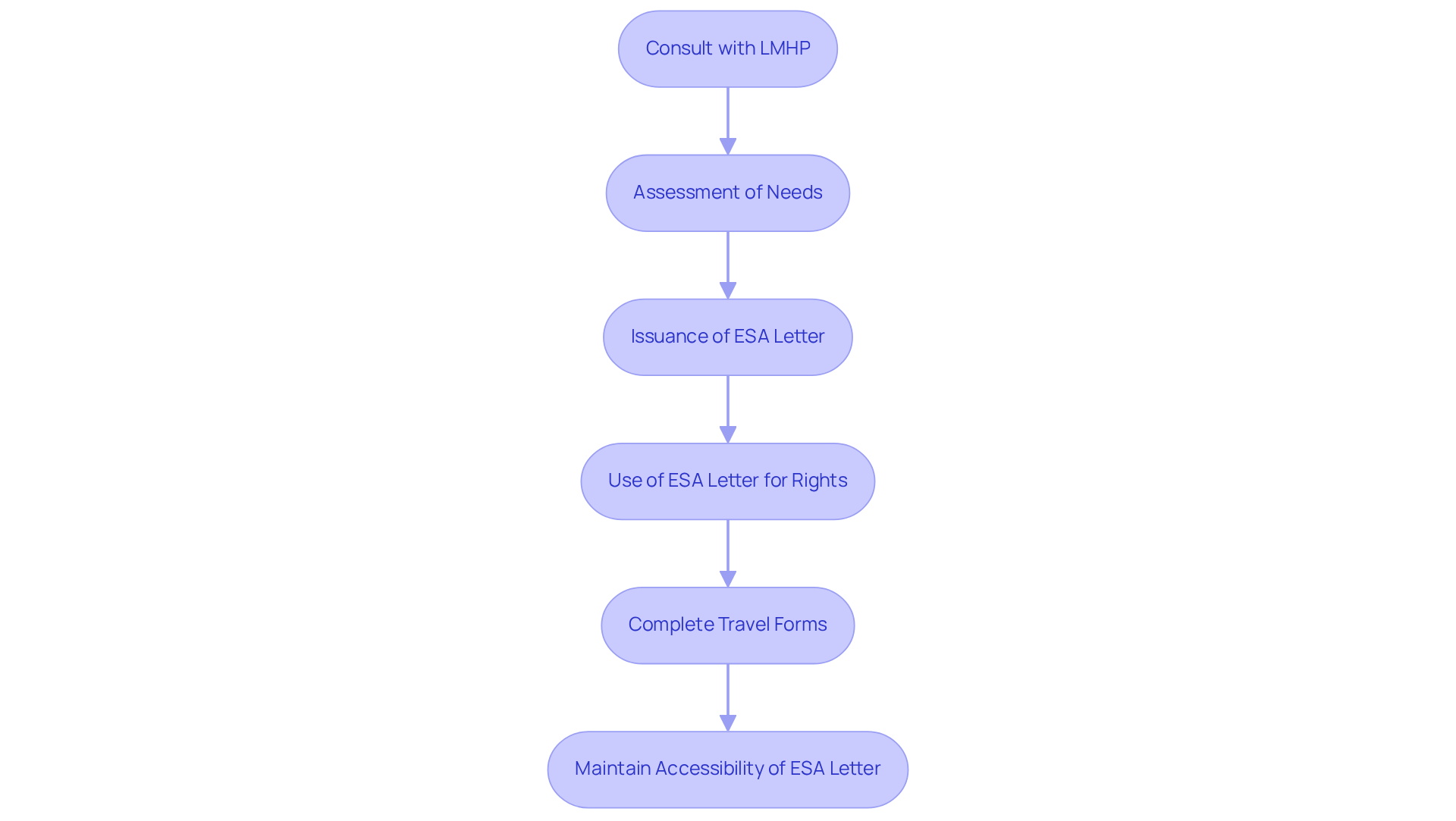

Understanding Federal ESA Laws: Your Guide to Rights and Documentation
by Lena Park
Last updated: July 8, 2025
Verified and Approved by:
Angela Morris,
MSW, LCSW
Fact Checked

Overview
This article highlights the important rights and documentation concerning Emotional Support Animals (ESAs) as outlined under federal laws, particularly the Fair Housing Act (FHA) and the Air Carrier Access Act (ACAA). Many individuals face emotional challenges that can feel overwhelming, and ESAs play a vital role in providing the support they need.
While these animals offer essential emotional comfort without requiring specialized training, it is necessary for individuals to obtain a letter from a licensed mental health professional. This letter serves as validation for their need for an ESA, which is crucial for accessing housing and travel rights. It also helps navigate the varying state laws surrounding ESAs.
Remember, you are not alone in this journey, and there are supportive resources available to help you along the way.
Introduction
Navigating the complexities of mental health can often feel like an uphill battle, especially for those who rely on Emotional Support Animals (ESAs) for comfort and companionship. Many individuals face emotional challenges that can be overwhelming, and understanding the federal laws governing these animals is crucial for protecting their rights and accessing necessary accommodations. This article explores the essential aspects of federal ESA laws, including the documentation required to advocate for emotional support animals in housing and travel settings.
With the evolving landscape of regulations, many are left wondering:
- What are the specific rights of ESA owners?
- How can they effectively navigate the legal maze to secure their support companions?
Rest assured, there is support available to help you through this journey.
Define Emotional Support Animals and Their Legal Status
Emotional Support Animals serve as vital companions for those navigating the challenges of mental health issues such as anxiety, depression, and PTSD. Unlike service animals, which undergo specific training to assist individuals with disabilities, emotional support animals do not require specialized training. Their primary purpose is to offer comfort and emotional support, providing a sense of security in difficult times.
For many, the struggle with mental health can feel isolating and overwhelming. The legal recognition of emotional support animals under federal esa laws, as well as the Fair Housing Act (FHA) and the Air Carrier Access Act (ACAA), is a beacon of hope. These federal esa laws protect the rights of individuals by ensuring that housing providers cannot impose additional fees or deposits for emotional support animals and cannot request sensitive medical information disclosing the nature of a person’s disability. This framework empowers individuals with mental health challenges to advocate for their right to keep their emotional support animals in pet-restricted accommodations, as protected under federal esa laws.
However, it’s important to recognize that ESAs are not covered under the Americans with Disabilities Act (ADA), which only acknowledges service animals, primarily trained dogs. To qualify as an ESA, individuals must obtain a letter from a licensed mental health professional, detailing the animal’s role in their treatment plan. This letter is essential for accessing the rights provided by the FHA and ACAA, as it validates the individual’s need for emotional support through their animal.
When traveling with an ESA, it is crucial to adhere to specific documentation requirements. For example, Air Canada requires travelers to complete the U.S. DOT Service Animal Air Transportation Form, which includes important details such as vaccination records and the names of the dog’s handler and trainer. Travelers must also certify that their ESA is trained in specific assistive functions, will not relieve itself on the airplane, can behave appropriately in public, and will be leashed at all times. If the flight exceeds eight hours, the U.S. DOT’s Animal Relief Attestation Form must also be completed, certifying that the assistance dog will either not urinate or defecate on the plane or can do so hygienically.
Wellness Wag offers a convenient online method to obtain valid ESA letters through their telehealth services, typically ensuring a quick turnaround of 24 hours. This timely support helps clients navigate the complexities of ESA documentation with ease. Moreover, the company provides a money-back guarantee, reinforcing customer satisfaction and confidence in their services. It’s also essential to be aware of the varying state laws regarding emotional support animals, as these can create confusion about their legal status under federal esa laws. Lastly, ESA letters are valid for one year, and individuals must renew them to maintain their rights.
Explore Federal Laws Governing Emotional Support Animals
The primary federal esa laws that govern Emotional Support Animals (ESAs) include the Fair Housing Act (FHA) and the Air Carrier Access Act (ACAA). For many individuals facing emotional challenges, these laws are essential lifelines. Under the FHA, those with emotional support animals are entitled to reasonable accommodations in housing. This means that landlords must permit such animals, even in no-pet policies, as long as the tenant can demonstrate a legitimate need. This legal framework is vital, as federal esa laws allow ESA owners to live in various housing types without facing discrimination, which significantly enhances their quality of life. It’s heartening to note that the FHA, along with federal esa laws, prohibits landlords from charging pet fees or imposing breed restrictions on emotional support animals, recognizing their integral role in managing mental health conditions.
However, navigating the air travel landscape can be more complicated. The ACAA allows emotional support animals to accompany their owners on flights, although airlines may impose specific documentation requirements. As of early 2021, the ACAA no longer recognizes emotional support animals as assistance creatures. This shift means they are treated like pets and are subject to airline pet regulations and charges. This change has understandably raised concerns among mental health advocates, as it may impose additional financial burdens on those who rely on emotional support animals. Recent estimates suggest that the increased fees for ESA travel could reach between $54 to $59.6 million annually, a significant concern for many.
It is crucial for emotional support animal owners to understand that while these regulations provide certain safeguards, they do not grant the same access privileges as assistance animals in public spaces, which are governed by the Americans with Disabilities Act (ADA). The ADA specifically protects assistance animals that are trained to perform particular tasks for individuals with disabilities, whereas ESAs primarily offer emotional support without specialized training. Therefore, ESA owners must navigate their rights carefully, ensuring they possess the necessary documentation from licensed healthcare providers to validate their need for an ESA. Furthermore, while assistance dogs are not legally required to be certified or registered, obtaining certification can enhance their credibility and ensure that the dog has met specific training standards. This can be beneficial for both the owner and the assistance dog, fostering a deeper bond and understanding between them.
Navigate the Process of Obtaining ESA Documentation and Rights
Acquiring an ESA letter begins with a consultation with a licensed mental health professional (LMHP), who can thoughtfully assess your mental health needs. This consultation can occur in person or through the increasingly popular telehealth services, offering you convenience and accessibility. During this evaluation, the LMHP will consider whether an ESA is a suitable addition to your treatment plan, taking into account factors such as anxiety, depression, or PTSD. If it is determined that an ESA would be beneficial for you, the LMHP will issue a letter that includes your name, the date, and a statement confirming the need for the ESA.
This letter is vital for exercising your rights under the Fair Housing Act (FHA), the Air Carrier Access Act (ACAA), and federal ESA laws. It allows you to live with your emotional support animal in pet-restricted housing and travel with them on airlines. If you plan to travel with your ESA, it’s important to complete the U.S. DOT Service Animal Air Transportation Form, which requires details about vaccinations and a certification that your animal is trained to behave appropriately in public. Additionally, for flights lasting eight hours or longer, you will need to fill out the U.S. DOT’s Service Animal Relief Attestation Form, ensuring that hygienic travel conditions are maintained.
Once you have your ESA letter, it’s wise to keep it easily accessible, as you may need to present it to landlords or airlines to secure your rights. Staying informed about any state-specific laws that may further protect federal ESA laws is also advisable, as regulations can vary significantly across different jurisdictions.
Typically, you can expect to receive your ESA documentation within 24 hours after your consultation, providing timely support when you need it most. As the demand for ESAs continues to grow, understanding the process and importance of proper documentation becomes essential for those seeking the emotional benefits of animal companionship. Additionally, Wellness Wag offers flexible payment plans starting at $32.25, making their services more accessible to individuals in need of support. Remarkably, 62% of ESA owners reported an improvement in their mental health during the pandemic, highlighting the importance of obtaining an ESA letter for mental health support.

Conclusion
Emotional Support Animals (ESAs) hold a vital place in the lives of those navigating the complexities of mental health challenges, offering both comfort and companionship. It is essential to grasp the legal framework surrounding ESAs, particularly the protections provided under federal laws like the Fair Housing Act (FHA) and the Air Carrier Access Act (ACAA). This understanding empowers individuals to advocate for their rights effectively. While ESAs may not enjoy the same access rights as service animals under the Americans with Disabilities Act (ADA), their recognized significance underscores the importance of proper documentation and adherence to specific regulations.
This article highlights key aspects of federal ESA laws, outlining the rights of ESA owners in relation to housing and air travel. It stresses the necessity of obtaining a valid ESA letter from a licensed mental health professional, which serves as the cornerstone for accessing these rights. Furthermore, it addresses the evolving regulations concerning air travel for ESAs, emphasizing the need for individuals to remain informed about state-specific laws that may influence their rights. The insights shared here aim to empower ESA owners to navigate their legal protections with confidence.
As awareness and demand for emotional support animals grow, it becomes increasingly important for individuals to comprehend their rights and the documentation required to uphold those rights. With mental health remaining a significant concern, the support offered by ESAs can be truly transformative. Advocating for awareness and understanding of federal ESA laws not only aids individuals in securing their rights but also nurtures a broader acceptance of the essential role these animals play in enhancing mental well-being.
Frequently Asked Questions
What are Emotional Support Animals (ESAs)?
Emotional Support Animals are companions that provide comfort and emotional support to individuals facing mental health issues such as anxiety, depression, and PTSD. Unlike service animals, they do not require specialized training.
What is the legal status of Emotional Support Animals?
ESAs are recognized under federal laws, including the Fair Housing Act (FHA) and the Air Carrier Access Act (ACAA), which protect the rights of individuals to keep their ESAs in pet-restricted accommodations without additional fees or requests for sensitive medical information.
Are Emotional Support Animals covered under the Americans with Disabilities Act (ADA)?
No, ESAs are not covered under the ADA. The ADA only recognizes service animals, primarily trained dogs, while ESAs do not require specific training.
How can someone qualify for an Emotional Support Animal?
To qualify for an ESA, individuals must obtain a letter from a licensed mental health professional that details the animal’s role in their treatment plan.
What documentation is required for traveling with an ESA?
Travelers must complete the U.S. DOT Service Animal Air Transportation Form, which requires information such as vaccination records and details about the handler and trainer. Additional forms may be necessary for flights exceeding eight hours.
How can individuals obtain an ESA letter?
Wellness Wag offers an online method to obtain valid ESA letters through telehealth services, typically providing a turnaround of 24 hours.
How long is an ESA letter valid?
ESA letters are valid for one year, and individuals must renew them to maintain their rights.
Are there varying laws regarding Emotional Support Animals in different states?
Yes, state laws regarding emotional support animals can vary, which may create confusion about their legal status under federal laws.
Certify Your Emotional Support Animal Today

Why You Can Rely on Us?
At Wellness Wag, we believe your pet deserves care rooted in both science and compassion. Each article is carefully researched, written in clear language for pet owners, and then reviewed by qualified professionals to ensure the information is evidence-based, current, and practical for real-life care. Our goal is to help you feel confident in making informed decisions about your pet’s health and well-being.
Reviewed by
Angela Morris, MSW, LCSW
Angela is a licensed clinical social worker with 20 years of experience in patient advocacy and community mental health. She has assisted numerous clients with ESA evaluations and brings a deep understanding of disability accommodations, ensuring that all information is accurate, supportive, and practical.

Written by :
Lena Park
Last Updated :
July 8, 2025












